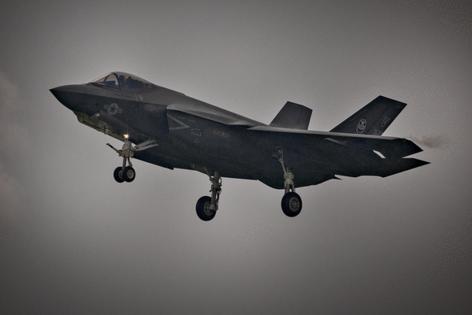Trump says US plans to sell F-35 jets to Saudi Arabia
Published in News & Features
WASHINGTON — President Donald Trump said the U.S. would sell F-35 fighter jets to Saudi Arabia, offering Crown Prince Mohammed bin Salman a prize he’s long cherished — even though many obstacles remain before he gets the stealthy planes.
Agreeing to sell F-35s to Saudi Arabia represents a major concession to bin Salman, who’s set to visit the White House on Tuesday, as Washington and Riyadh look to deepen ties. One motivation for Trump is to lure Saudi Arabia into establishing diplomatic ties with Israel.
“I will say that we will be doing that — we’ll be selling F-35s,” Trump said when asked about the sales Monday at the White House. He called Saudi Arabia a “great ally.”
But Trump’s say-so is only a small step on a much longer process that will require years of pain-staking negotiations — with delivery of the stealth fighter not at all certain. In that way, it mirrors what happened when Trump agreed to sell the plane to the United Arab Emirates late in his first term. More than five years later, the UAE still hasn’t received the jets.
F-35 planes are among the world’s most advanced weapons systems, and the Saudis have long wanted them, according to officials familiar with the negotiations. Each plane costs about $100 million. Shares of Lockheed Martin Corp., which makes the planes, were up by as much as 1.1% after Trump’s remarks.
The jets’ advanced technology is also one reason why the deal will be fraught. Trump’s planned approval comes despite the eagerness of Israel, the only Middle Eastern state that currently has the fighter jet, to protect its monopoly.
Under American law, Israel is guaranteed weapons needed to maintain its “qualitative military edge” over Arab nations. U.S. officials have said they can provide that assurance regardless of F-35 sales without specifying publicly what they would offer Israel.
Israel is “keeping an eye on QME, so they’re going to be careful about those F-35s and they’re going to probably want to weigh in on those,” Foundation for Defense of Democracies Executive Jonathan Schanzer wrote in a note.
There are other concerns. A Pentagon report has raised concerns that China could acquire the plane’s advanced technology if a sale to Saudi Arabia was approved, citing Beijing’s defense ties with Riyadh, the New York Times reported.
The case of the UAE offers insight into the hurdles ahead. Late in his first term, Trump pushed through approval for the sale of up to 50 F-35 fighter jets to the UAE in a deal valued at up to $10.4 billion. In exchange, the UAE agreed to join the Abraham Accords normalizing relations with Israel.
While the Abraham Accords went ahead, the F-35 deal stalled after a succession of disagreements between the two countries. When former President Joe Biden took over from Trump in 2021, his administration pushed the UAE to remove Huawei Technologies Co. from its telecommunications network and take other steps to distance itself from China.
After lengthy negotiations, the UAE removed Huawei from some of its networks. The Biden administration wanted other restrictions, including limits on the UAE’s use of the jets. In the end, those conversations came to a halt.
Many other challenges await this time as well. Saudi Arabia must make a formal ask for the jets, and Congress must approve. The Pentagon would then need to finalize a so-called Letter of Offer and Acceptance, and then Saudi Arabia will need to negotiate with Lockheed on terms.
Deliveries would be years off, and Lockheed would need to juggle the production schedules and priorities of 19 foreign partners and customers who have ordered 1,172 jets. Israel has taken delivery of or committed to purchase 75 of the stealthy jets.
Even so, Trump’s nod adds to the momentum for Saudi Arabia and signals his backing for a crucial regional ally.
“MBS wants a defense deal with the U.S. like Qatar’s, F-35s like Israel’s, a deal on chips like the UAE’s, and U.S. help to develop a civilian nuclear program,” Dina Esfandiary, the Middle East Geoeconomics Lead for Bloomberg Economics, wrote. “He won’t get it all, but he’ll get some, and that’s a win.”
©2025 Bloomberg L.P. Visit bloomberg.com. Distributed by Tribune Content Agency, LLC.







Comments